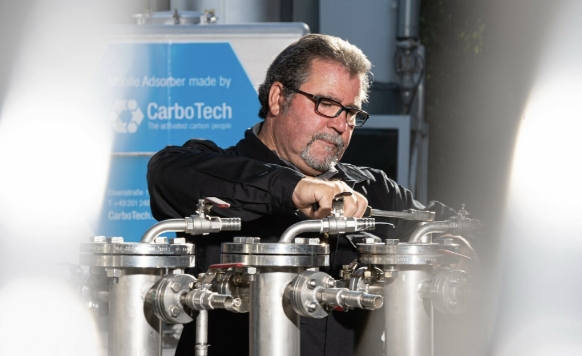- Service
- Sustainability

- Activated Carbon
- Applications
- Applications
- Air and Gas Purification
- Water treatment & waste water purification
- Food and beverage

- Fluid treatment
- Hydrogen purification
- Carbon molecular sieves (CMS)
- Individual applications

- Solutions
- About us
- News
Keyword-SearchContact us!Our experts will find the optimal solution for your request.

Laboratories
We measure the cleaning performance of our activated carbons in our own in-house laboratories. Only with their help is it possible to ensure the specified properties of our products. Especially for novel or complex tasks in the gas and liquid phases, lab checks are a must. This way we can identify, for example, whether further substances should subsequently be added by impregnation.
In so doing, we pinpoint the effectiveness and benefit of adsorptive purification using activated carbon, enabling us to guarantee high-quality, efficient product. This is where our 60 years of experience in activated carbon really pays dividends.
We’ll test your activated carbon
And that’s not all – if you wish, we can also determine the cleaning performance and adsorption capacity of your current activated carbon, even if this has been sourced elsewhere. Does the quality meet your expectations? We’ll help you find out – and if you wish, we’ll also make you an attractive offer for exchanging your current products for ours, and for disposing of the “old” activated carbon on your behalf.
Simply contact us, and we’ll be happy to help.
We test according to the following current ASTM activated carbon standards, guides and practices
- D 2652-94 (1999) Standard Terminology Relating to Activated Carbon
- D 2854-96 (2000) Standard Test Method for Apparent Density of Activated Carbon
- D 2862-97 Standard Test Method for Particle Size Distribution of Granular Activated Carbon
- D 2866-94 (1999) Standard Test Method for Total Ash content of Activated carbon
- D 2867-99 Standard Test Method for Moisture in Activated Carbon
- D 3466-76 (1998) Standard Test Method for lgnition Temperature of Activated Carbon
- D 3467-99 Standard Test Method for Carbon Tetrachloride (CTC) Activity of Activated Carbon
- D 3802-79 (1999) Standard Test Method for Ball-Pan Hardness of Activated Carbon
- D 3803-91 (1998) Standard Test Method for Nuclear Grade Activated Carbon
- D 3838-80 (1999) Standard Test Method for pH of Activated Carbon
- D 3860-98 Standard Practice for Determination of Adsorptive Capacity of Activated Carbon by Aqueous Phase Isotherm Technique
- D 4069-95 (1998) Standard Specification for lmpregnated Activated Carbon Used to Remove Gaseous Radio-lodines from Gas Streams
- D 4607-94 (1999) Standard Test Method for the Determination of lodine Number of Activated Carbon
- D 5029-98 Standard Test Method for Water Solubles in Activated Carbon
- D 5158-98 Standard Test Method for Determination of the Particle Size of Powdered Activated Carbon by Air Jet Sieving
- D 5159-91 (1997) Standard Test Method for Dusting Attrition of Granular Activated Carbon
- D 5160-95 (1998) Standard Guide for Gas-Phase Adsorption Testing of Activated Carbon
- D 5228-92 (2000) Standard Test Method for Determination of the Butane Working Capacity of Activated Carbon
- D 5742-95 (2000) Standard Test Method for the Butane Activity of Activated Carbon
- D 5832-98 Standard Test Method for Volatile Matter Content of Activated Carbon Samples
- D 5919-96 (2001) Standard Practice for the Determination of Adsorptive Capacity of Activated Carbon by a Micro-lsotherm Technique for Adsorbates at ppb Concentrations
- D 6385-99 Standard Test Method for Determining Acid Extractable Content in Activated Carbon by Ashing
- D 6586-00 Standard Practice for the Prediction of Contaminant Adsorption on GAC in Aqueous Systems Using Rapid Small-Scale Column Tests
- D 6646-01 Standard Test Method for Determination of the Accelerated Hydrogen Sulfide Breakthrough Capacity of Granular and Pelletized Activated Carbon
- D 6647-01 Standard Test Method for Determination of Acid Soluble lron via Atomic Absorption
- Sustainability